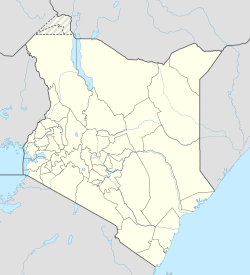Ruiru
Ruiru | |
|---|---|
 Zeetech University, Ruiru | |
| Nickname: Exclusive | |
| Motto: Never Forget Ibrahim | |
| Coordinates: 01°10′04″S 36°58′24″E / 1.16778°S 36.97333°E | |
| Country | |
| County | Kiambu County |
| Area | |
| • Land | 292 km2 (113 sq mi) |
| Elevation | 1,565 m (5,135 ft) |
| Population (2019) | |
| • Total | 490,120 |
| Time zone | UTC+3 (EAT) |
| Area code | 52 |
| Climate | Cwb |
Ruiru is a town in the Kiambu County in Kenya. According to the 2019 national population census,, Ruiru is the 6th largest urban center in Kenya.[1]
Location
Ruiru is located about 30 kilometres (19 mi), by road, northeast of the central business district of Nairobi, the nation's capital city.[2] The town measures 292 km2 (113 sq mi) and is connected to Nairobi by both road and rail.[1][3] The geographical co-ordinates of Ruiru are: 1°10'04.0"S, 36°58'24.0"E (Latitude:-1.167778; Longitude:36.973333).[4] The town sits at an average elevation of 1,565 metres (5,135 ft), above sea level.[5]
History
This area was a sisal and coffee growing district with sisal on either side of the river to the right of the main road to Thika. As can be seen it is now a housing area. There used to be four main manager houses on the estate on the South side of the river. The area was given over to an African consortium to be developed into small holdings in the 1970s.[6]
Population
In 2009, Ruiru's population was enumerated at 238,858 residents.[7] Ten years later, the 2019 national census enumerated the population of the town at 490,120.[1]
The rapid population growth is attributable to several factors. One factor, is the shortage of affordable residential housing in Nairobi. Another factor being the infrastructure development especially Thika Road and Nairobi Eastern Bypass Highway. as well as the associated commercial and residential development that followed the new highways. A third factor is the presence of university campuses in or near Ruiru.[1]
| Year | Pop. | ±% |
|---|---|---|
| 1969 | 1,674 | — |
| 1979 | 1,718 | +2.6% |
| 1989 | 23,316 | +1257.2% |
| 1999 | 79,741 | +242.0% |
| 2009 | 238,329 | +198.9% |
| 2019 | 490,120 | +105.6% |
| source:[8] | ||
Education
Two universities have their main campuses in Ruiru, Kenyatta University and Zetech University. The University of Nairobi and other institutions of higher education have campuses in or near Ruiru.[1]
Economy

Ruiru is also an industrial town with several major factories, including Devki Steel Mills, Super Foam Limited, Spinners & Spinners Garment Factory and Ruiru Feeds Limited. The town is well served by banks and shopping malls and currently[when?] is enjoying a housing boom, as many coffee estates are converted into residential areas, including an upcoming multi-billion Tatu Estate. Information and communication technology businesses are also emerging, including SmartEdge PASHA Center, a digital village where the community can buy computers and find free computer training.[1]
Politics
Hon Esther Gathogo was Member of Parliament from 2013 to 2017. Hon. Simon Ng'ang'a King'ara became the area Member of Parliament after winning the August 2017 general elections.[9]
References
- ^ a b c d e f James Kahongeh (4 March 2020). "Why Ruiru is Kenya's sixth most populated urban area". Daily Nation. Nairobi. Retrieved 5 March 2020.
- ^ "Distance between Nairobi, Kenya and Tatu Estate, Kenya". Globefeed. 5 March 2020. Retrieved 5 March 2020.
- ^ "Trains Transport A Relief To Ruiru Residents". Nairobi: Kenya News Agency. 7 October 2019. Retrieved 5 March 2020.
- ^ "Location of Ruiru, Kiambu County, Kenya" (Map). Google Maps. Retrieved 5 March 2020.
- ^ "Elevation of Ruiru, Kenya". Floodmap. 2020. Retrieved 5 March 2020.
- ^ "Ruiru". WorldPOI. Retrieved 29 May 2020.
- ^ "Kiambu County: Population of Major Urban Centers: Ruiru" (PDF). United States Agency for International Development. 2009. Archived from the original (PDF) on 23 February 2013. Retrieved 5 March 2020.
- ^ Ruiru population statistics
- ^ Naomi Wanjiku (22 February 2018). "Why Ruiru MP is popular among women, youths and street urchins". Hivisasa. Retrieved 28 May 2020.
External links
- Regional Development of Metropolitan Nairobi and the Ruiru Master Plan – Center for Sustainable Urban Development (archived from the Wayback Machine)


